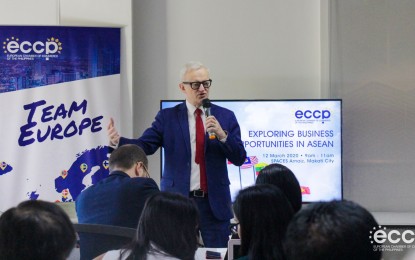
European Chamber of Commerce of the Philippines (ECCP) president Lars Wittig (Photo courtesy of ECCP)
MANILA – The Philippines now becomes more attractive to European investors as the coronavirus disease 2019 (Covid-19) cases surge in other Southeast Asian countries while these are also experiencing political instability, a foreign chamber executive said.
Lars Wittig, the new president of European Chamber of Commerce of the Philippines (ECCP), said Wednesday the long lockdown measures in the country have been imposed amid the threats of the faster-spreading Delta variant.
Wittig said unlike other Association of Southeast Asian Nations (Asean) that become agile in locking down and opening again, the Philippines’ community quarantine measures “show added success with the current wave (of Covid-19 cases) that is suffocating most of our neighboring countries.”
“We did not get in the same manner as those countries did with the Delta variant, and that I will attribute to our restrictive policies otherwise,” he said.
As of Tuesday, Indonesia still has the highest number of active Covid-19 cases at 273,750 followed by Malaysia with 262,713; Vietnam with 195,178; Thailand with 192,334; the Philippines with 127,703; and Myanmar with 58,925.
Active cases in Laos rose to 4,259 on Tuesday, Cambodia has 2,156 active cases, Brunei with 1,508, and Singapore has the lowest active cases at 826.
Although the Philippine government’s lockdown measures remain restrictive, the ECCP president said the private sector appreciated the added mobility during this year’s enhanced community quarantine (ECQ) status.
Aside from the manageable Covid-19 cases in the country despite the threats of Delta variant, the political stability in the Philippines is an attractive factor for European firms to invest here.
“What we have in common is Covid-19. But (in) Thailand and Malaysia, what’s standing out there is concerns by foreign investors about their political predicament, and that has shown dramatically in foreign direct investments into those two countries,” Wittig added.
Last week, Malaysian Prime Minister Muhyiddin Yassin resigned as the political crisis escalated.
Anti-government protests persist in Thailand as they call for political reforms, while Myanmar unrest continues as the junta runs its government.
While the Philippines will have its election year in 2022, ECCP executive director Florian Gottein said this becomes an opportunity for businesses as consumption rises during an election year.
“...Investors will also look (at) how this country (has) been able to manage this pandemic,” Gottein added. (PNA)
